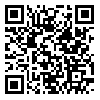مجله رویش روانشناسی از دادن گواهیهای کاغذی معذور است. لطفا تقاضا نکنید. همه گواهی ها در صفحه شخصی کاربران موجود است.
year 13, Issue 6 (summer 2024 2024)
Rooyesh 2024, 13(6): 231-240 |
Back to browse issues page
Download citation:
BibTeX | RIS | EndNote | Medlars | ProCite | Reference Manager | RefWorks
Send citation to:



BibTeX | RIS | EndNote | Medlars | ProCite | Reference Manager | RefWorks
Send citation to:
Shahian H, Molaee M, Saadat S. (2024). Persian version of Self-Critical Rumination Scale (SCRS) in students. Rooyesh. 13(6), 231-240.
URL: http://frooyesh.ir/article-1-5565-en.html
URL: http://frooyesh.ir/article-1-5565-en.html
1- MA student in Clinical Psychology, Department of Psychology, University of Tabriz, Tabriz, Iran.
2- BA in Psychology, Department of Psychology, Rasht Branch, Islamic Azad University, Rasht, Iran.
3- PhD in Psychology, Neuroscience Research Center, Guilan University of Medical Sciences, Rasht, Iran. ,sajjadsaadat69@gmail.com
2- BA in Psychology, Department of Psychology, Rasht Branch, Islamic Azad University, Rasht, Iran.
3- PhD in Psychology, Neuroscience Research Center, Guilan University of Medical Sciences, Rasht, Iran. ,
Abstract: (2928 Views)
This study aimed to validate the Self-Critical Rumination Scale (SCRS) for a sample of Iranian university students. This descriptive-evaluative study translated and validated the Persian version of (SCRS) in a sample of Iranian students. A convenience sample of 307 students from the University of Tabriz was recruited for this study in 2023. To examine the test-retest reliability of SCRS, 50 participants were randomly selected to fill out this scale twice at an interval of two weeks. The Self-Critical Rumination Scale (SCRS), the Depression, Anxiety, and Stress Scale - 21 Items (DASS-21, Loviband & Loviband,1995), and the Short form of the self-compassion Scale (SCS-SF, Raes et al., 2011) were used in this study. According to the results of exploratory factor analysis (EFA), 1 factor was identified, which explains 55% of the total variance. The results of criterion validity showed that SCRS had a positive relationship with Depression, Anxiety, and Stress and a negative relationship with self-compassion (P<0.05); which respectively shows the convergent and divergent validity of this tool. According to Cronbach's alpha, results showed the favorable test-retest reliability (0.73) and internal consistency (0.90) of SCRS. Since SCRS exhibited acceptable validity and reliability in a sample of Iranian students, It is suggested that this scale be used to measure self-critical rumination in Iranian students.
Type of Article: Research |
Subject:
Psychometric
Received: 2024/08/5 | Accepted: 2024/08/21 | ePublished: 2024/08/31
Received: 2024/08/5 | Accepted: 2024/08/21 | ePublished: 2024/08/31
Send email to the article author
| Rights and permissions | |
 |
This work is licensed under a Creative Commons Attribution-NonCommercial 4.0 International License. |





